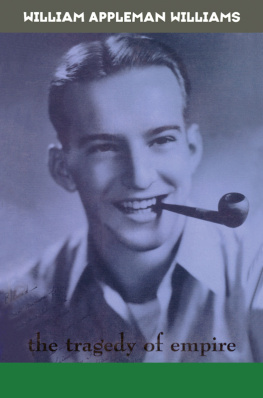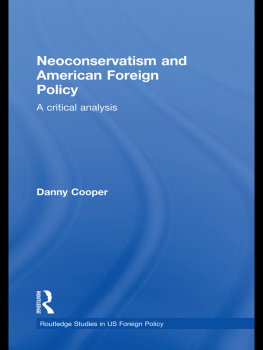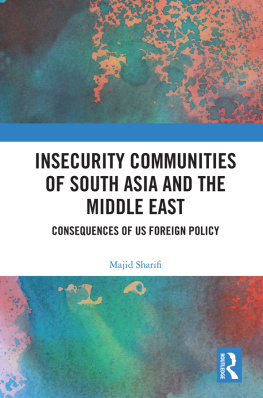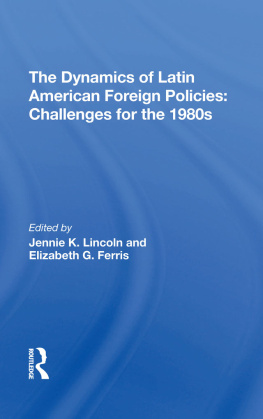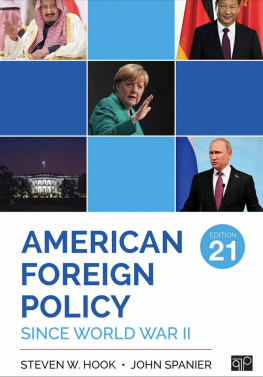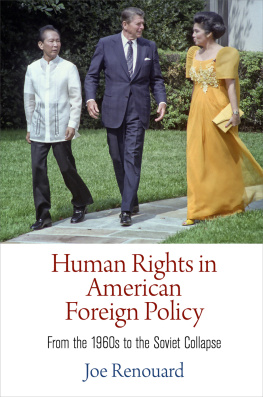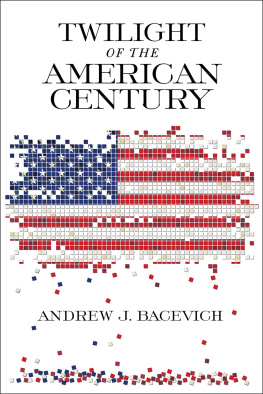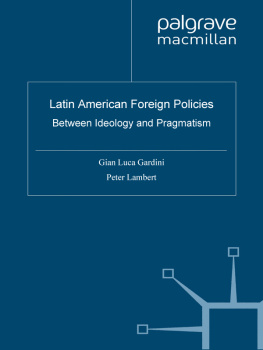
BOOKS BY WILLIAM APPLEMAN WILLIAMS
IN NORTON PAPERBACK
The Tragedy of American Diplomacy
The Contours of American History
America in Vietnam: A Documentary History
(ed., with Thomas McCormick, Lloyd
Gardner, and Walter LaFeber)
FOR CORRINE
Copyright 1959, 1962, 1972 by William Appleman Williams
Foreword and Afterword copyright 2009
by W. W. Norton & Company, Inc.
All rights reserved
For information about special discounts for bulk purchases,
please contact W. W. Norton Special Sales at
specialsales@wwnorton.com or 800-233-4830
Production manager: Devon Zahn
The Library of Congress has cataloged the printed edition as follows:
Williams, William Appleman.
The tragedy of American diplomacy / William Appleman Williams.
50th anniversary ed.
p. cm.
Originally published: Cleveland : World Pub. Co., c1959.
Includes bibliographical references.
ISBN 978-0-393-33474-6 (pbk.)
ISBN 978-0-393-07979-1 (e-book)
1. United StatesForeign relations20th century. I. Title.
E744.W56 2009
327.73009'04DC22
2009004324
W. W. Norton & Company, Inc.
500 Fifth Avenue, New York, N.Y. 10110
www.wwnorton.com
W. W. Norton & Company Ltd.
Castle House, 75/76 Wells Street, London W1T3QT
This is a time for searching criticism, all right,
but for criticism of the whole society.
JAMES RESTON, 1958
We are never so much the victims of another,
as we are the victims of ourselves.
JULIUS LESTER, 1970
How do you ask a man to be the last man
to die for a mistake?
JOHN FORBES KERRY, 1971
Lloyd Gardner
When Bill Williams showed the manuscript of his new book, The Tragedy of American Diplomacy, to his mentor at the University of Wisconsin, Fred Harrington urged him not to publish it. Harrington admired his former student, and had been instrumental in bringing him back to Madison in the fall of 1957 from the University of Oregon. He was worried, however, about how such a critical book would be received, and what it might do to the career of a very promising young academic.
A Naval Academy graduate, William Appleman Williams had served in the South Pacific before being badly injured when a Japanese shell landed near his boat during an assault on an island. After leaving the Navy at the end of the war, he came to Wisconsin and completed his degree in American history. It was the height of cold war orthodoxy, even in academia. True, the University of Wisconsin had always been a stronghold of progressive thought, but Tragedy went beyond the dominant realist critique of American policy as overly moralistic to discuss fundamental cold war assumptions and, indeed, the forces that had shaped the nations foreign policies since the 1890s. In place of a critique that stressed the dangers of idealism, Williams relentlessly pursued the connections between the nations political economy and its foreign policy actions. Midway through the book, for example, Williams quoted William S. Culbertson, a career diplomat who specialized in trade questions from the Wilson era to the New Deal: Our economic frontiers are no longer coextensive with our territorial frontiers. Williams argued that this statement summed up American policy: No one ever offered a more succinct description and interpretation of the single most important aspect of twentieth-century American diplomacyeither in general or pertaining explicitly to the nations involvement in World Wars I and II.
The original publisher of Tragedy was a small firm, World Publishing, with offices in Cleveland and New York. Among the first reviews was one written by Adolf A. Berle Jr., an original brains truster in the Roosevelt Administration who later went into the State Department at a high level as an Assistant Secretary of State. Berle took the book very seriously and suggested it deserved respectful attention. Since Williams had been particularly critical of the New Deal as a missed opportunity to make both intellectual and material changes in American society, the review was something of a surprise. For this charge (and others) he was often a target of the liberal establishments special ire.
But Berle did not seem to care, even at the moment John F. Kennedy was challenging Eisenhowers supposedly lax attitude about the Cuban Revolution as a rallying cry for liberals. He reviewed Tragedy in the Sunday New York Times Book Reviewthe premier location for drawing attention to new books. Entitled A Few Questions for the Diplomatic Pouch, it began: Salute is due William Appleman Williams for a brilliant book on foreign affairs, gladly given despite profound disagreement by this reviewer with many of his statements and with some of his conclusions. The book attempts a historical critique, Berle wrote, while refusing the free ride historians often give themselves by shying away from developing a theory and drawing lessons. Williams was absolutely right, he wrote, that American policy did not accommodate to revolutionary changes, and that it was now essential to start working with social systems different from our own. Berle saw a contradiction, however, between Williamss economic determinism and his argument that the United States could have developed differently. The imperialism charge, for example, is a piece of semantics, Berle alleged. America in the nineteenth century did expand, but into empty land. It is one thing to conquer a subject people; another to occupy vacant real estate. Influence is acquired by expanding trade, but it is not the same as colonial domination seized by conquest.
Other critics with much less sympathy for Tragedys analysis of the mainsprings of American policy would make similar comments. To the general question of economic determinism, Williams had several responses. First, he argued that his critics often confused specific economic policy issues with a general outlook. Thus, as an example, he pointed out how Washington eased pressure on Mexico during the 1938 oil expropriation crisis, out of concern about Axis rivalries, not simple Good Neighborliness. Second, he argued that policy-makers effectively internalized their beliefs about the way American democracy worked and its needs, and then they predicated policies not upon specific advantages alone (although sometimes they did do so in blunt terms), but on something called the general welfare, or, more often after World War II, national security.
To support this last point, Williams took special note of President William McKinleys description of the impact of the burgeoning Cuban rebellion in the second half of the 1890s, the first depression decade. In instructions to his new minister to Spain, McKinley made it clear what he expected Madrid to do and what the United States was entitled to expect. The chronic condition of trouble in Cuba, he wrote, causes disturbances in the social and political condition of our own peoples... and tends to delay the condition of prosperity to which this country is entitled. Commenting on this cable Williams wrote, It revealed beyond any possibility of misunderstanding the inner logic of all expansionist thought whereby both opportunity and difficulty, good and evil, are externalized As Frederick Jackson Turner once acknowledged in a moment of deep insight, the frontier itself was a gate of escape from existing responsibilities; and when men began to act on the frontier thesis they merely sustained that pattern of defining issues in such a way that the solutions became progressively dependent upon external factors.
The third answer Williams gave to the charge of economic determinism was that motivation really came down to the way one defined the world. His path-breaking interpretation of the Open Door Policy, first enunciated in specific terms by Secretary of State John Hay at the end of the nineteenth century in regard to imperial rivalries in China, posited the way Americans have approached the world ever since. There were two Open Door Notes sent to the European powers and Japan, he observed. The first, in 1899, called upon them to recognize equality of trade opportunities within their acknowledged spheres of influence, and asked for a formal response. The second, sent on July 4, 1900, in the midst of the turmoil of the Boxer Rebellion, did not ask for a response, but proclaimed that American policy was to oppose any effort to take advantage of the turmoil to impair Chinas territorial or political integrity.
Next page

